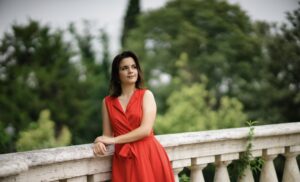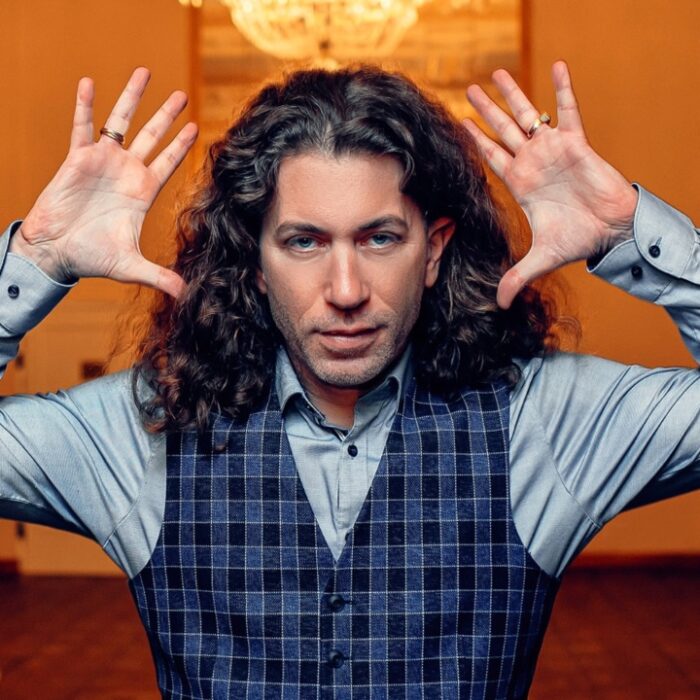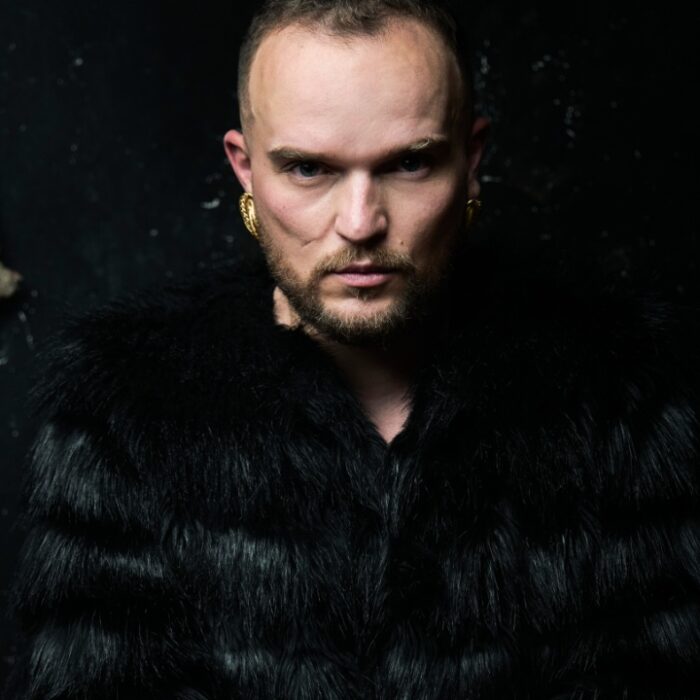
Q & A: Mezzo-Soprano Emma Alessi Innocenti Talks About The Teatro Sperimentale & Her Role In ‘Procedura Penale’
By Alan Neilson(Photo credit: Alessio Chao)
The 25-year-old Italian mezzo-soprano Emma Alessi Innocenti is still at the stage in her career in which she is attempting to establish herself as a known singer within the industry. Of course, at such a young age, she has had relatively few opportunities to perform in fully staged operas. But by sheer chance, OperaWire has reviewed a number of them and, in each case, was very impressed by her performances.
The first occasion was at Vicenza in Lirica’s production of Vivaldi’s “L’Olimpiade” in 2020, when Innocenti was a mere 21-years-old, yet it was her interpretation of Megacle that made her standout among the relatively inexperienced cast, with an expressive and intense performance. It was a more mature Innocenti that appeared in Händel’s cantata “Aci, Galatea e Polifemo” in 2023, in which she was cast in the role of Galatea, with OperaWire drawing attention to “the detail and subtlety with which she is able to furnish the vocal line” and describing the quality of expression as “breathtaking”.
As OperaWire was reviewing Luciano Chailly’s opera, “Procedura Penale” in Spoleto this summer, in which Innocenti was appearing, it seemed a good opportunity to find out more about this up-and-coming young singer.
OperaWire: What made you want to become an opera singer?
Emma Alessi Innocenti: What I find most interesting about singing, is that it gives you the opportunity to be someone else, someone completely different from yourself. This is what I really love about theatre, but I also love singing, so opera is the perfect combination. I believe that the act of singing is one of the most beautiful things a human being is able to do.
OW: What was your pathway into opera?
EAI: I was fascinated by theatre and singing from a young age. However, I didn’t come from a musical family, which had both positive and negative consequences. On the one hand, there was no pressure from my family, but I am very aware that coming from a musical family can have many advantages, even down to choosing the right place to study. I was fortunate that I came from a very supportive family, and they helped me a lot in making the right decisions.
I was born and still live in Florence. As I enjoyed singing, my parents enrolled me in a children’s choir when I was five or six-years-old. I was very lucky because the school provided the children’s choir for the Maggio Musicale, where I sang in “Carmen”, “Tosca” and other operas. It was a really beautiful experience because I had the opportunity to enjoy the theater and appear on stage at an early age, but with the innocence of a child.
I went to a high school that specialized in music, where I studied piano, which has been really useful for my musical education. When I played the piano, I used to get nervous, but when I’m singing, I don’t get nervous at all, even when I am under considerable pressure. I have always found it natural and comfortable, maybe it’s because of the experience I gained at a very young age.
After high school, I had singing lessons at the ‘Luigi Cherubini’ Conservatory in Florence, where I graduated in 2022. Then I spent a year doing concerts, competitions and small roles before I started attending an advanced course in voice at the Santa Cecilia Academy in Rome with Sara Mingardo. She is an excellent teacher. She is very encouraging and very precise, but can be severe; however, it is in a nice way as she wants you to become the best version of yourself. She’s always very positive.
OW: How would you describe your voice?
EAI: I like to think I have a very expressive voice that I can use to interpret the music. In my first years of studying, I used to have a lot of difficulty with my high notes, but I worked a lot on them and now it’s not a problem. My vocal range is quite wide; I can reach from a low G to high C fairly easily.
I think I have an agile voice, and although I sing passages of coloratura, I have to work on them; they’re not always easy, especially if I have not sung any coloratura for a while.
I don’t have a particularly big voice, but for my repertoire, which is mainly the baroque, Mozart and contemporary music, it is suitable. But it is probably too small for the late romantic repertoire. I will never sing Verdi, that is for sure.
OW: You are currently taking part in a training program offered by the Teatro Lirico Sperimentale in Spoleto. What does this involve, and how useful have you found it?
EAI: The Teatro Lirico Sperimentale of Spoleto provides one of the most prestigious advanced training courses for young opera singers in Italy. Many great Italian artists have started their careers there, such as Franco Corelli, Giuseppe Di Stefano, Renato Bruson, Anna Moffo, Anita Cerquetti, Leo Nucci, Mariella Devia, Maria Agresta, Eleonora Buratto, Daniela Barcellona, Sonia Ganassi, Roberto De Candia, Bruno De Simone and Riccardo Zanellato. I earned a place on the course after winning first prize in the 2024 “A. Belli” Competition.
All the winners are invited to move to Spoleto for five months from the end of April until October during a two-year period. In my case, this was for the years 2024 and 2025. So far, I have found the experience really useful for me. It provides a perfect balance between musical education and professional activity. During the first three months, I attended several masterclasses with great artists and teachers, such as Marina Comparato, Carmela Remigio, Nicola Ulivieri, Marco Boemi and Raffaele Cortesi. Moreover, we had daily lessons with piano accompanists, studying our repertoire and opera roles for the following season. The last two months were dedicated solely to the opera productions and concerts planned by the Sperimentale. I am playing the roles of Paola in the modern opera “Procedura penale” by L. Chailly and Eurilla in the baroque intermezzo “Eurilla e Beltramme” by D. Sarro.
It has been a very enriching experience; I have learned so much!
OW: What is the story of “Procedura Penale”, and what role are you playing?
EAI: A group of friends meet for an afternoon tea in the home of the Countess Mauritia Delormes. They all appear to be very close. Suddenly, however, the situation changes, and they accuse the countess of committing a murder. It is not a joke; they mean it, and she is forced to defend herself. The dining room becomes a courtroom. In the end, everything returns to normal, and they continue drinking their tea and eating their cake.
My character’s name is Paola. She is one of the countess’ friends.
OW: What challenges did you experience in bringing Paola to the stage?
EAI: My character is cruel, but she doesn’t appear to be on the surface. This is difficult to portray because even when she is drinking tea and chatting with her friends at the beginning of the opera, she is cruel, and I have to be able to show this while appearing to be friendly. I have to show that she is a false person and her relationship as a friend is false.
It is not a particularly difficult role to sing, but it is a modern work, so you have to keep an eye on rhythm and intonation. The role was originally written for contralto, but I have to say I feel comfortable singing the role. One reason is that the orchestra below the singing parts is not heavy, and so I don’t feel overwhelmed by it.
OW: How do you assess your performance?
EAI: I think I did a good job, especially in terms of character rendering. The role of Paola is not very demanding from a vocal perspective. What was hard for me was to convey to the audience the subtle cruelty of her character, especially as it is set against comedy episodes of the Theatre of the Absurd set-up.
The stage director, Bongiovanni, did a great job. He helped us a lot, insisting that all the singers paid attention to every single gesture and facial expression. Paola is also an overweight woman, so it has been interesting for me to deal with different body shapes, in which I have to step into someone else’s body!
OW: What have been the biggest challenges in your career so far?
EAI: I would say discovering my own boundaries, my own limitations, and then getting other people to understand and accept them.
Also, I know my repertoire is not as popular as say Puccini and Verdi, especially in Italy, so it is difficult for singers with voices like mine, such to find opportunities to perform.
OW: What are your goals for the next few years?
EAI: Obviously, to have more opportunities to sing in operas. I want to become established so that I can live and work with singing. Although I am not particularly interested in competitions, maybe over the next couple of years I will take part in more, which will help me in becoming better known if I’m successful in them. I think that this will be the best method for establishing myself as the theaters don’t seem to provide opportunities to unknown singers.
OW: If this interview were taking place 10 years in the future, what would you hope you would be saying about your career?
EAI: Maybe it sounds banal, but I would like to be saying that I have been appearing in beautiful opera productions with great conductors and stage directors at the best opera houses and festivals in Europe and around the world, such as the Salzburg Festival and Early Music Festival in Innsbruck.



